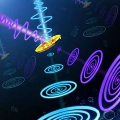As quantum computers scale, the rise of multi-user and cloud-based quantum platforms can lead to new security challenges. Attacks within shared execution environments become increasingly feasible due to the crosstalk noise that, in combination with quantum computer's hardware specifications, can be exploited in form of crosstalk attack. Our work pursues crosstalk attack implementation in ion-trap quantum computers. We propose three novel quantum crosstalk attacks designed for ion trap qubits: (i) Alternate CNOT attack (ii) Superposition Alternate CNOT (SAC) attack (iii) Alternate Phase Change (APC) attack. We demonstrate the effectiveness of proposed attacks by conducting noise-based simulations on a commercial 20-qubit ion-trap quantum computer. The proposed attacks achieve an impressive reduction of up to 42.2% in output probability for Quantum Full Adders (QFA) having 6 to 9-qubit output. Finally, we investigate the possibility of mitigating crosstalk attacks by using Residue Number System (RNS) based Parallel Quantum Addition (PQA). We determine that PQA achieves higher attack resilience against crosstalk attacks in the form of 24.3% to 133.5% improvement in output probability against existing Non Parallel Quantum Addition (NPQA). Through our systematic methodology, we demonstrate how quantum properties such as superposition and phase transition can lead to crosstalk attacks and also how parallel quantum computing can help secure against these attacks.
翻译:暂无翻译



